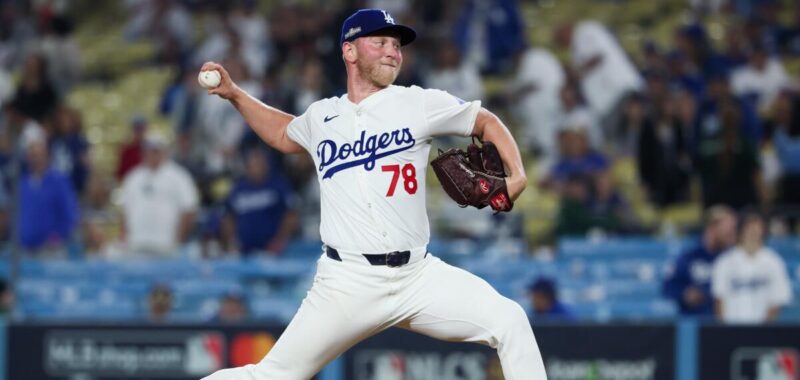
In 1966, the Dodgers roared into the World Series, in search of their third championship in four years. They did not score much that season, but they did not have to. They boasted a pitching staff that featured three Hall of Famers: Sandy Koufax, Don Drysdale and Don Sutton.
The Dodgers scored once in the second inning of Game 1, once in the third inning of Game 1, and never again in that World Series. The Baltimore Orioles swept the series by shutting out the Dodgers over the final 33 innings.
In the 120 years of postseason history, no team has ever thrown so many consecutive shutout innings.
Until Sunday, that is.
This year’s Dodgers, a team with a pitching staff cobbled together more by improvisation than master plan, tied the Orioles’ record Sunday, completing a third consecutive shutout — the last two division series games against the San Diego Padres, and the NL championship series opener against the New York Mets.
The 1966 Orioles used four pitchers, including Hall of Famer Jim Palmer, to cover their 33 innings.
The 2024 Dodgers used 13, including rookie Ben Casparius, an injury replacement on the postseason roster. Casparius, the final Dodgers pitcher Sunday, said he had no idea he was about to pitch his team into the record books.
“That’s cool,” Casparius said. “So we’re tied now?”
They are, in a different way befitting a different era.
In the 1988 postseason, Orel Hershiser pitched 20 consecutive scoreless innings all by himself, including back-to-back shutouts. In the 1965 World Series, Koufax pitched back-to-back shutouts within three days.
Hershiser, now a Dodgers broadcaster, said the record-tying feat should not be diminished because no one throws complete games in October any more.
“It’s quite an accomplishment with so many different guys,” Hershiser said in a text message. “Hard enough to find a couple of bullpen pieces that are hot, so to have this many guys shut down the opponent is amazing.
“And this is postseason, against great hitters.”
Evan Phillips, one of the 10 relievers to contribute to the streak, said he grew up a fan of the Orioles.
“I missed the Jim Palmer days,” he said. “Honestly, I was more of a Cal Ripken Jr. fan than anything.
“But it’s definitely special to see starting pitchers go deep into the game.”
Jack Flaherty pitched seven innings Sunday, and hats off to him. But let’s take another look at those 1966 Dodgers during the regular season: 13 pitchers, five starters, 52 complete games.
In the final season of his career, Koufax pitched 323 innings. Drysdale, Sutton and Claude Osteen each pitched at least 225 innings.
“The game has certainly changed,” Dodgers manager Dave Roberts said. “From our perspective, I think it’s just a collective effort.”
The 2024 Dodgers: 40 pitchers, 17 starters, one complete game. Of the 40 pitchers, 20 spent time on the injured list, including one actually named Hurt.
No one pitched more than 140 innings. The only ones with more than 100 innings: Gavin Stone and Tyler Glasnow, currently on the injured list along with Clayton Kershaw, Tony Gonsolin and Dustin May.
The insistence on maximizing velocity and limiting pitches and innings has robbed fans of what used to be one of the great joys of October baseball: the marquee starter who would will his team to victory and pitch until that victory was secure: the likes of Koufax and Hershiser here, and the likes of Bob Gibson and Madison Bumgarner elsewhere.
Of the 33 innings pitched by the Dodgers during their record-tying streak, relievers threw 18 of them.
Phillips appreciates the aesthetics of the ace, but he also appreciates the evolution of the game that allows him to play a key role in the postseason.
“As a bullpen guy, I certainly don’t mind,” Phillips said.
There was no parade for the 1966 Dodgers, and their Hall of Fame arms. For the 2024 Dodgers, and their collection of arms, a parade is seven victories away.

